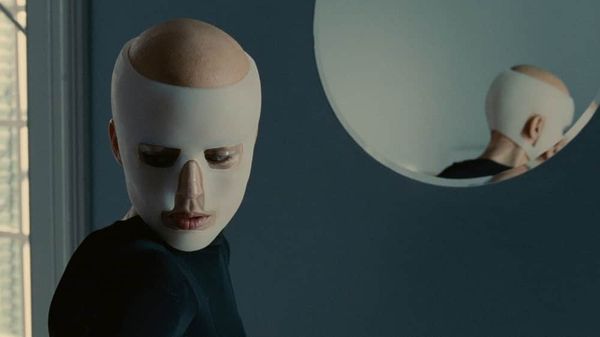Eye For Film >> Movies >> The Skin I Live In (2011) Film Review
The Skin I Live In
Reviewed by: David Graham

An outlandish fable incorporating the Frankenstein myth, Stockholm Syndrome psychology and the therapeutic power of yoga, Almodovar's latest is appreciably akin to his previous output while subverting the recent trend for torture porn by emphasizing how physical experience can have unexpected mental repercussions. Antonio Banderas makes a welcome return to both serious acting and his native language, while the ravishing Elena Anaya makes the most of an insane break-out performance that will surely lead to a more high-profile international career.
Robert Ledgard is an innovative surgeon who has been working on a burn-resistant skin since his wife's tragic suicide. He has also been secretly grooming a replacement for his love, using his medical expertise and the seclusion of his imposing mansion to keep her captive. Painful memories and unexpected visitors from the past threaten to disturb Ledgard's carefully controlled experiment, while his subject struggles to cope with her attachment to her captor and her desire for escape.

As ever, Almodóvar walks a fine line between pastiche and homage, clearly referencing Hitchcock's Vertigo and Powell's Peeping Tom while robbing imagery pretty much wholesale from Georges Franju's eerie Eyes Without A Face. The film also takes a turn into Human Centipede territory, hinging on an audacious twist that will see much of the audience give up on the plot just as it's getting interesting.
If you can ride out the film's implausible nature there are reams of heady psycho-sexual ambiguity to enjoy; the characters all harbor complexes and emotions that come out in unpredictable configurations. Almodóvar's trademark narrative divergence is in full effect - there's a lengthy mid-section flashback that unapologetically and repeatedly throws everything you think you know about the players out the window - but he keeps a delicious sense of control over his fabulously grotesque concoction. The early lingering shots of Banderas' clinical activity prepares the audience for the director's surgically precise compositions and approach, while the anti-sensational way he treats his subject matter is fully appropriate and reflects his lead's emotional distance from his own monstrous behavior. The director's ever-vibrant color schemes and jaunty soundtrack also distinguish the film from its macabre sci-fi leanings.
Banderas's character's motivations are only revealed gradually, allowing the actor to grow into the role with a subtle streak of menace that is married to deep reserves of experience-accrued pathos. Almodóvar alumnus Marisa Paredes has a deliciously fraught role as Ledgard's maternal maid, throwing up creepy hints of incest and barely-concealed jealousy. Anaya embraces the absurdity of her role to give us one of the most intriguing monsters of recent years; her confusion and sadness are exponentially tangible as we come to understand her situation more fully. The characters revolve around each other in constantly shifting permutations of Frankenstein and monster, with the dynamic between parent and child being especially significant to the story.
Several moments don't quite hit the emotional mark the director could have aimed for, while the horror aspect is under-whelming but admirably dialed down. Flashes of brutality are made both more uncomfortable and darkly amusing for the often bizarre nature of the imagery, while a traditional climax is deliberately underplayed to leave the audience invested in a more resonant ending. It's a topsy-turvy treat for adventurous, open-minded viewers; horror fans and Almodóvar aficionados might find their expectations dashed but it's a brave and lingering film that deserves at least a second viewing. The Skin I Live In might not offer the bittersweet grit of Volver or the deep sadness of the director's best work in the likes of All About My Mother, but it's another endlessly imaginative treatise on gender politics that also serves as a pertinent fable warning us of the dangers of indulging our God complex.
Reviewed on: 24 Aug 2011


















